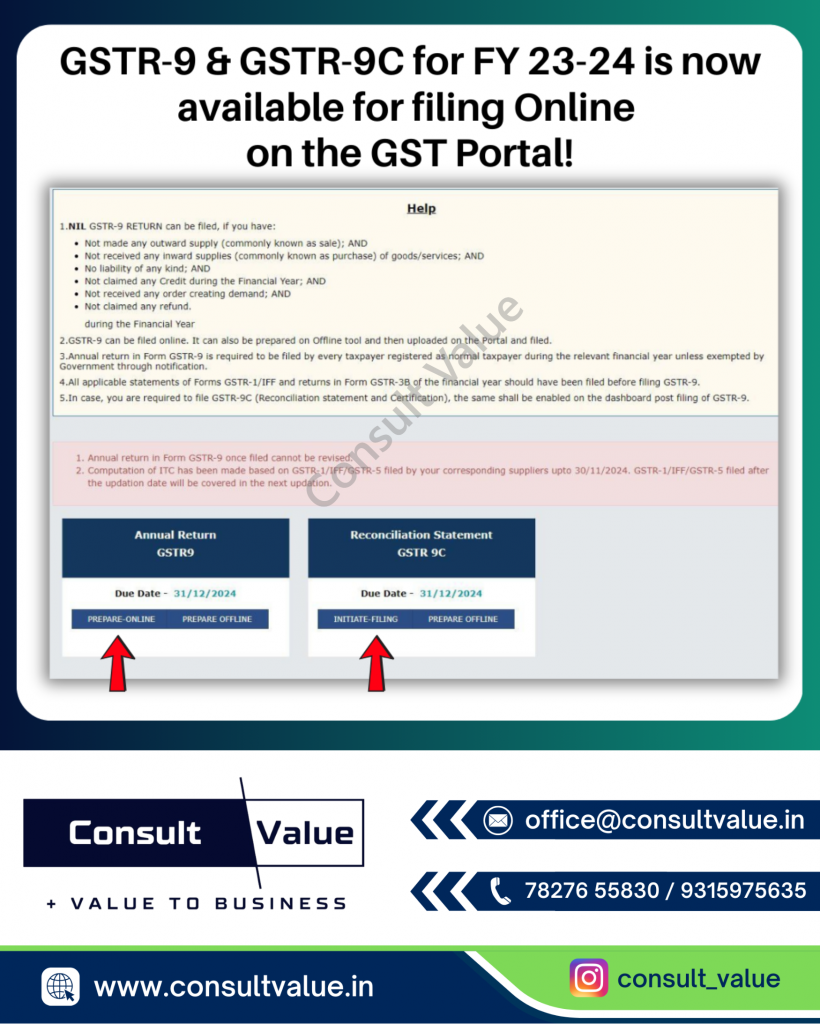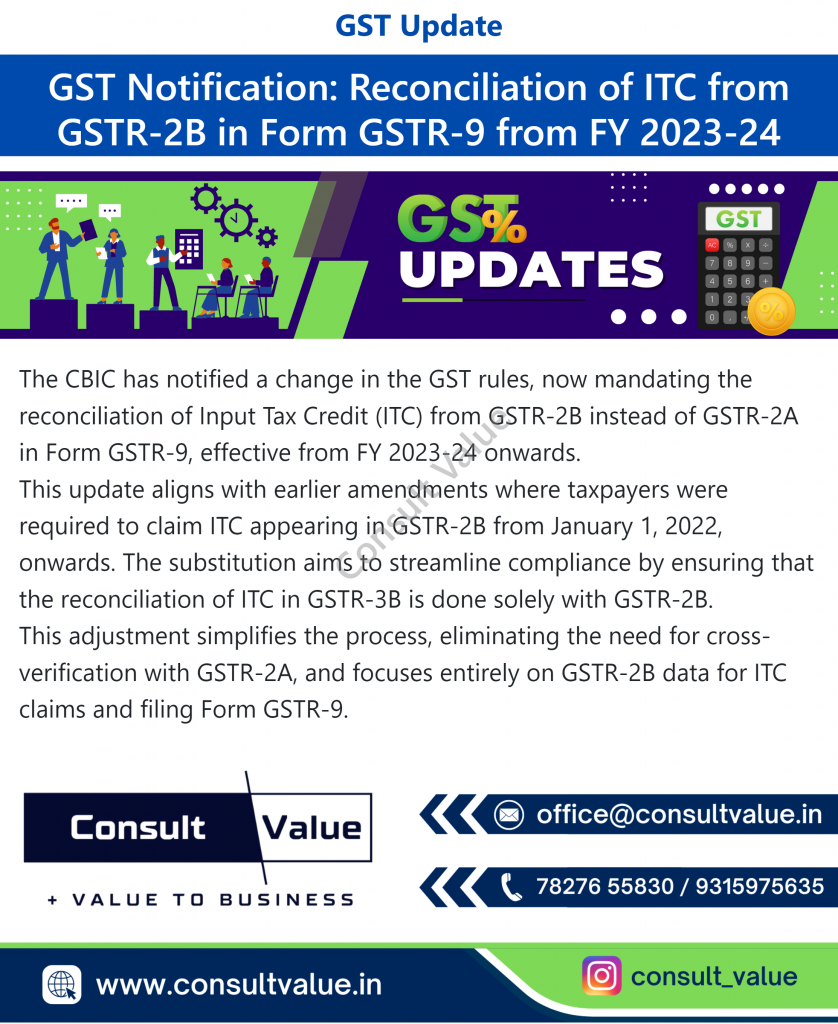
Monthly Archives: October 2024
New Tax Clearance rules for Travelers- A walkthrough by Consult Value
The new tax clearance rules for travelers coming to or leaving India, effective from October 1, 2024, are expected to introduce certain key changes in customs procedures, especially regarding the declaration of high-value goods, improved digital tax tracking systems, and tighter compliance for personal goods brought in from abroad.
Here’s a breakdown of the anticipated changes for Indian travelers:
1. Mandatory Declaration for High-Value Goods
- New Requirement: Travelers will be required to declare high-value items such as gold, luxury goods, electronics, or jewelry above a certain threshold. These goods will need to be declared upon entry or exit from India.
- Impact: Non-declaration or underreporting of goods above this threshold may lead to penalties, additional taxes, or confiscation by customs authorities.
2. Digital Platforms for Pre-Arrival Customs Declaration
- New Requirement: India will further develop and implement digital platforms where travelers can pre-declare goods online before entering or exiting the country. This will include goods subject to customs duties.
- Impact: This will simplify the customs clearance process, reduce delays at the airport, and ensure that tax liabilities are settled before arrival.
3. Revised Duty-Free Allowances
- New Requirement: The duty-free allowances for items that travelers can bring into India without paying customs duties are expected to be revised. Current exemptions (e.g., duty-free on goods up to ₹50,000 for Indian citizens or ₹15,000 for foreigners) may be updated to reflect inflation or regulatory adjustments.
- Impact: Travelers may need to pay duties on goods exceeding these new thresholds, and failure to comply can result in penalties.
4. Increased Scrutiny on Gold and Electronics
- New Requirement: Indian customs will likely increase scrutiny on gold, silver, and electronic items carried by travelers, especially those returning from countries where these goods are cheaper, like the UAE, Singapore, or Malaysia.
- Impact: These goods will need to be declared, and travelers may need to show invoices or proof of purchase. Customs duties and taxes will be applicable on excess quantities.
5. Higher Penalties for Non-Compliance
- New Requirement: Penalties for non-compliance, under-declaration, or smuggling of goods are expected to become stricter. Increased surveillance, tracking systems, and data-sharing between customs authorities will make it easier for Indian customs to detect violations.
- Impact: Failing to declare taxable goods could lead to hefty fines, confiscation of goods, or even legal actions.
6. Streamlining VAT and GST on Imported Goods
- New Requirement: India may implement more streamlined procedures for the application of GST (Goods and Services Tax) on certain imported goods. VAT refunds for items purchased abroad may also see changes to ensure smoother processing at airports.
- Impact: Indian travelers purchasing goods abroad may need to factor in these changes when calculating the total cost of bringing items back to India.
7. Increased Surveillance on International E-Commerce
- New Requirement: Travelers carrying goods bought through international e-commerce platforms like Amazon, eBay, or AliExpress may face additional scrutiny. Indian customs will apply GST and other taxes to ensure that these goods are properly declared and taxed.
- Impact: If travelers bring in goods purchased online from abroad, they should ensure that all invoices are in order and be prepared to declare them for customs duties.
8. Automated Customs Clearance Systems
- New Development: More airports in India will adopt automated clearance systems and digital scanners that can track taxable goods, cross-check declarations, and calculate duties. These systems are aimed at reducing delays and enhancing compliance.
- Impact: Travelers will experience faster processing times but should ensure that all declarations are accurate, as automated systems will flag inconsistencies.
9. Traveler Type-Based Tax Rules
- New Requirement: Different rules may apply based on the type of traveler. Frequent business travelers, for example, could face less stringent clearance processes compared to occasional travelers bringing in high-value items.
- Impact: Business travelers and professionals moving goods regularly for work may have simplified customs procedures, but tourists or individuals traveling for personal reasons may face more detailed checks.
10. Data Sharing and Tracking
- New Requirement: India’s customs authorities will enhance data-sharing capabilities with international partners, tracking the movement of goods and ensuring tax compliance across borders.
- Impact: Indian authorities will be able to better track undeclared goods across countries, making it more difficult for travelers to evade taxes on high-value imports.
11. Clarity on Export of Personal Goods
- New Development: Exporting personal goods, such as art, antiques, or luxury goods, will require stricter documentation, especially for high-value items. India is likely to introduce better systems to track the movement of such goods for tax and legal reasons.
- Impact: Travelers exporting high-value items should be prepared for additional paperwork and possibly export taxes.
12. Foreign Currency Declarations
- New Requirement: The limit for carrying foreign currency out of or into India without declaration may be revised. Travelers will need to declare any foreign currency exceeding the new thresholds.
- Impact: Failure to declare could lead to penalties, and authorities will scrutinize travelers for large sums of undeclared foreign currency.
13. Stricter Rules for Importing Personal Electronic Devices
- New Requirement: Importing personal electronic devices such as laptops, mobile phones, or gaming consoles in excess of permitted limits will likely face higher scrutiny, with taxes being levied on the second or third device.
- Impact: Travelers should be aware of the number of electronic devices they are allowed to carry without paying additional customs duties.
Conclusion:
The new tax clearance rules from October 1, 2024, in India are aimed at enhancing compliance, preventing tax evasion, and simplifying customs processes. Travelers should be prepared to declare high-value goods, use digital platforms for pre-declaration, and ensure they are familiar with updated duty-free thresholds.
Indian citizens returning from abroad and foreign travelers entering the country should be mindful of these changes to avoid unnecessary penalties or delays. Always check the latest updates from Indian customs or tax authorities before traveling.
